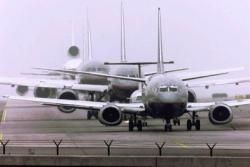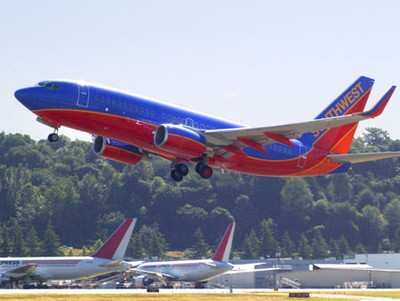If You Want Your Flight Cancelled, Fly Out Of ORD
 Airline passenger volume grew in
2007 despite worsening statistics on flight delays and
cancellations, but that doesn't mean savvy frequent fliers aren't
changing their travel habits. In what may be the tip of an iceberg
of airline customer backlash, Chicago-area fliers are learning that
flying from Midway can give them a better chance of staying on
schedule than using O'Hare International, even if it sometimes
costs more.
Airline passenger volume grew in
2007 despite worsening statistics on flight delays and
cancellations, but that doesn't mean savvy frequent fliers aren't
changing their travel habits. In what may be the tip of an iceberg
of airline customer backlash, Chicago-area fliers are learning that
flying from Midway can give them a better chance of staying on
schedule than using O'Hare International, even if it sometimes
costs more.
The US Department of Transportation's Bureau of Transportation
Statistics reports that for the first 10 months of 2007, O'Hare
held onto two distinctions it would have preferred to lose. Of the
nation's 32 busiest airports, O'Hare was dead last in on-time
performance, and led the nation in cancelled flights. According to
research by the Chicago Tribune, nearly 4 of every 100 flights from
O'Hare were cancelled in 2007, led by shorter routes flown on
smaller, regional jets.
The horrible record at O'Hare cannot be blamed on volume. The
world's busiest airport, Hartsfield-Jackson Atlanta International,
saw fewer than 6,200 flight cancellations for the first 11 months
of 2007, less than half O'Hare's 13,434. And it's not just weather,
either -- while Midway is separated from O'Hare by only 14 miles,
it saw only one percent of its flights cancelled in 2007, compared
with almost four percent for O'Hare.
Chicago physician Julie Ericson told the Trib she knowingly paid
$100 more for a flight to Phoenix from Midway than what the same
trip would have cost from O'Hare.
"This is the first time it's costing me more to fly from Midway
than from O'Hare, but it's worth it just to avoid the painful
experience and uncertainty of O'Hare," she said. "I want the best
shot at getting where I am going fast and not spending the whole
time traveling or not arriving at all."
The new year doesn't seem to be going any better. The Tribune
reports through January 18, cancellations at O'Hare totalled
1,124... while only 69 flights from Midway were cancelled. Erin
O'Donnell, the city's managing deputy aviation commissioner at
Midway, told the paper, "Midway recovers from some conditions
quicker because we have a lower volume." In 2007, Midway handled
about 300,000 flights, O'Hare almost 927,000.
The Tribune's analysis found that one big advantage Midway has
over O'Hare is Southwest Airlines -- which has the best on-time
record of the major carriers, is less reliant on hub cities in its
routings, and has a strong presence at Midway. Southwest is also
free of the labor unrest which plagues some competitors. Industry
analysts say many of the flights cancelled over the holidays by
United Airlines were necessitated by pilots refusing voluntary
overtime.
Based on the paper's research and numbers from the Department of
Transportation, it appears a reasonable strategy for minimizing
risks of late or cancelled flights would be to fly from smaller
airports, on carriers at (relative) peace with their unions,
choosing routes which stay clear of the New York metro area, and
avoiding regional jets.

Bob Flynn, the FAA's traffic management officer for all
Chicago-area airports, told the Tribune some regional jets and
their pilots are not qualified to fly in severe low-visibility
conditions, making regional short-hops among the first to be
cancelled in bad weather.
 ANN's Daily Aero-Linx (04.30.25)
ANN's Daily Aero-Linx (04.30.25) ANN FAQ: Turn On Post Notifications
ANN FAQ: Turn On Post Notifications Classic Aero-TV: Agile Aeros Jeff Greason--Disruptive Aerospace Innovations
Classic Aero-TV: Agile Aeros Jeff Greason--Disruptive Aerospace Innovations Aero-News: Quote of the Day (04.30.25)
Aero-News: Quote of the Day (04.30.25) ANN's Daily Aero-Term (04.30.25): Expedite
ANN's Daily Aero-Term (04.30.25): Expedite




